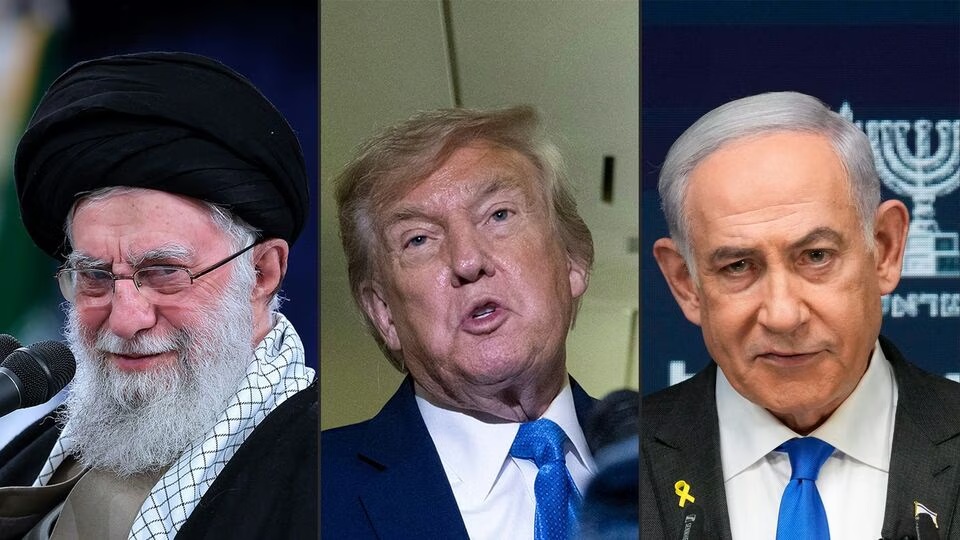Former U.S. President Donald Trump declared on Tuesday, June 24, 2025, that both Israel and Iran had breached the terms of the U.S.-brokered ceasefire just hours after it was declared, throwing the fragile truce into immediate uncertainty and raising fears of a renewed conflict across the Middle East.
Speaking at a press briefing ahead of a NATO leadership forum in the Netherlands, Trump, who played a central role in mediating the agreement between the two longtime foes, stated plainly:
“They violated it, but Israel violated it too… I’m not happy with Israel.”
The rare public rebuke of Israel from a U.S. leader, especially from Trump, widely regarded as one of the most pro-Israel presidents in modern history, sent shockwaves through diplomatic and defense circles.
Ceasefire on Paper, Missiles in the Air
The ceasefire, announced by Trump in the early hours of June 24, aimed to bring a halt to a 12-day war.
The war saw over 1,000 deaths in Iran and nearly 30 in Israel, alongside significant infrastructural and military damage on both sides.
However, within hours of the ceasefire taking effect, both nations were accusing the other of fresh aggression.
According to Israeli Defense Minister Yoav Gallant, Iran launched multiple ballistic missiles targeting northern Israeli towns shortly after 3 a.m. local time, well past the ceasefire deadline.
The Iron Dome defense system intercepted several of the missiles, but others struck residential areas, reportedly killing four civilians and injuring over a dozen.
Iran’s Islamic Revolutionary Guard Corps (IRGC) denied the attack, calling Israel’s claims “false and diversionary.”
It rather accused Israel of violating the ceasefire with continued aerial bombardments near Tehran, Shiraz, and military sites in Kermanshah province.
An Iranian government spokesperson added,
“We respected the ceasefire timeline. What Israel calls ‘pre-emptive strikes’ were carried out after their own provocations. We are defending our sovereignty.”
Trump’s Message: “Bring Your Pilots Home”
Frustrated by both sides’ immediate non-compliance, Trump issued a strong warning on Truth Social, his personal media platform:
“ISRAEL. DO NOT DROP THOSE BOMBS. IF YOU DO IT IS A MAJOR VIOLATION. BRING YOUR PILOTS HOME, NOW!”
He also criticized Iran, though his tone was noticeably more restrained.
“Both countries need to act with restraint. The world is watching. The Middle East cannot afford another full-scale war,” he told reporters.
Trump’s tone has drawn attention not only for its sharpness but also for signaling a possible shift in how U.S. leadership may view Israeli military decisions moving forward.
Casualties and Regional Fallout
The humanitarian toll continues to mount:
In Israel, four civilians were confirmed dead in Tuesday’s missile strike, three in Beersheba and one in Haifa.
Magen David Adom rescue services said at least 14 people were injured, some critically.
In Iran, Israel claimed responsibility for airstrikes on seven IRGC facilities, reportedly killing two generals and at least 12 officers.
Iran said civilian infrastructure, including a prison complex in Shiraz, was also hit.
Meanwhile, a limited missile attack by Iran on a U.S. military base in Qatar (Al Udeid) on Monday night further complicated the regional landscape.
Though no casualties were reported, it triggered emergency diplomatic talks in Doha, as well as temporary airspace closures over Qatar and southern Israel.
International Reactions and Diplomatic Warnings
European and Middle Eastern leaders responded swiftly.
French President Emmanuel Macron and Germany’s Friedrich Merz urged restraint, calling for independent verification of ceasefire compliance.
Qatar, which had helped mediate, condemned the Iranian strike on its soil and warned against attacks endangering third-party nations.
The United Nations called for an immediate investigation into both sides’ alleged violations.
It also reminded the international community that the targeting of civilians and aid convoys may constitute war crimes.
In Gaza, violence also escalated as Israeli troops reportedly opened fire on civilians gathered around an aid truck, killing 25 and prompting condemnation from human rights groups.
What’s Next? A Ceasefire on the Brink
Though both Israel and Iran officially remain party to the ceasefire, the situation remains fluid.
Trump emphasized that any further violations would collapse the agreement and potentially ignite a wider regional war.
U.S. officials are now working through back channels with Qatar, Turkey, and Oman, hoping to stabilize communications and salvage the truce.
In closing, Trump said:
“This is a test—for Israel, for Iran, and for the world.
“Peace takes more than promises.
“It takes accountability.”







